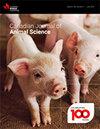肉用小母牛饮用水中硫酸钠浓度的影响,以及亚水杨酸铋对 H2S 生成和纤维消失的体外影响
IF 1
4区 农林科学
Q3 AGRICULTURE, DAIRY & ANIMAL SCIENCE
引用次数: 0
摘要
本研究评估了 1) 提高饮用水中硫酸盐浓度对干物质摄入量(DMI)、水摄入量、瘤胃发酵和表观总消化率的影响;以及 2) 水硫酸盐浓度和亚水杨酸铋(BSS)剂量对体外瘤胃发酵的影响。八头反刍插管肉用小母牛(382 ± 45 千克)采用重复不完全 3 × 3 拉丁正方形设计。水处理含有 342 ± 29(LS)、2,785 ± 72(MS)或 4,948 ± 163 mg/L(HS)硫酸盐。收集瘤胃消化液以评估硫酸盐水和 BSS 剂量(0.0、0.2、0.4 和 0.6% 干物质)对瘤胃 H2S 体外产生的影响。采食量随硫酸盐水浓度的增加而线性增加(P = 0.002),但DMI不受影响。饮用 MS 和 HS 的母牛在饮水后 10.5 小时的瘤胃 H2S 含量高于 LS(硫酸盐 × 时间,P < 0.001)。体外 H2S 产量(瘤胃接种物的微克和微克/毫升)随着硫酸盐的增加而增加并趋于稳定(P < 0.001),并且随着 BSS 剂量的增加而线性减少(P < 0.001)。水中硫酸盐浓度的增加不会对饮水量或采食量产生负面影响,但会增加瘤胃中 H2S 的浓度。亚水杨酸铋可减少 H2S 的产生。本文章由计算机程序翻译,如有差异,请以英文原文为准。
Effect of sodium sulfate concentration in drinking water for beef heifers, and the in vitro effect of bismuth subsalicylate on H2S production and fibre disappearance
This study evaluated the effects of 1) increasing the concentration of sulfate in drinking water on dry matter intake (DMI), water intake, ruminal fermentation, and apparent total-tract digestibility; and 2) water sulfate concentration and bismuth subsalicylate (BSS) dose on in vitro ruminal fermentation. Eight ruminally cannulated beef heifers (382 ± 45 kg) were used in a replicated incomplete 3 × 3 Latin square design. Water treatments contained 342 ± 29 (LS), 2,785 ± 72 (MS), or 4,948 ± 163 mg/L (HS) sulfate. Ruminal digesta was collected to evaluate water sulfate and BSS dose (0.0, 0.2, 0.4, and 0.6% dry matter) on ruminal H2S production in vitro. Water intake increased linearly as water sulfate concentration increased (P = 0.002) but DMI was not affected. Heifers drinking MS and HS had greater ruminal H2S at 10.5 h after water provision than LS (sulfate × time, P < 0.001). In vitro H2S production (µg and µg/mL of rumen inoculum) increased and plateaued with increasing sulfate (P < 0.001) and was linearly reduced (P < 0.001) by increasing BSS dose. Increasing water sulfate concentrations did not negatively affect water or feed intake but increased ruminal H2S concentrations. Bismuth subsalicylate may reduce H2S production.
求助全文
通过发布文献求助,成功后即可免费获取论文全文。
去求助
来源期刊

Canadian Journal of Animal Science
农林科学-奶制品与动物科学
CiteScore
2.30
自引率
0.00%
发文量
51
审稿时长
6 months
期刊介绍:
Published since 1957, this quarterly journal contains new research on all aspects of animal agriculture and animal products, including breeding and genetics; cellular and molecular biology; growth and development; meat science; modelling animal systems; physiology and endocrinology; ruminant nutrition; non-ruminant nutrition; and welfare, behaviour, and management. It also publishes reviews, letters to the editor, abstracts of technical papers presented at the annual meeting of the Canadian Society of Animal Science, and occasionally conference proceedings.
 求助内容:
求助内容: 应助结果提醒方式:
应助结果提醒方式:


